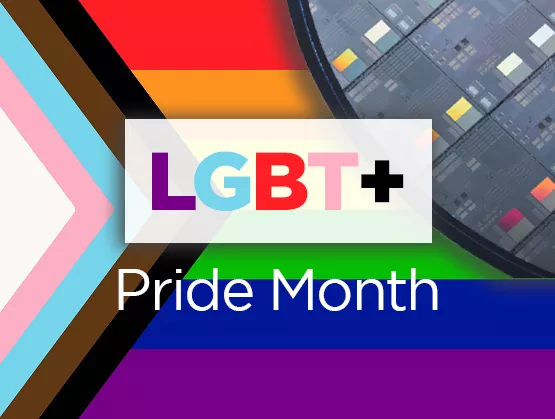
If I were applying for a job on your team, you would see an engineer with decades of supply chain experience who comes from a typical Midwest upbringing. What you may not see is that I am creative and persistent, a dedicated problem solver, and a disruptor – someone who may not conform to your expectations. There are many others like me: professionals at the top of their game, looking for challenges where their skills and passion are the best fit. The trouble is you may miss us in your talent search or not find us among your applicants.
I don’t remember every job I’ve ever applied for, but I do distinctly recall one for which I didn’t apply. There was just one problem: I learned the hiring manager had donated large amounts of money to support Prop 8 in California — the bill that opposed same sex marriage.
This was a dealbreaker. I am a queer Latina who has had to fight for the same rights that others take for granted. For example, I petitioned my peers at Rose-Hulman Institute of Technology to fund an LGBT+ group like they did every other student group at the school, but they declined. Ultimately it was the school administration that funded our LGBT+ group directly. My journey to create a family was long and arduous. Even something as simple as visiting my wife in the hospital required additional paperwork prior to legalized same-sex marriage. When you’re always an exception, it’s difficult to find your place.
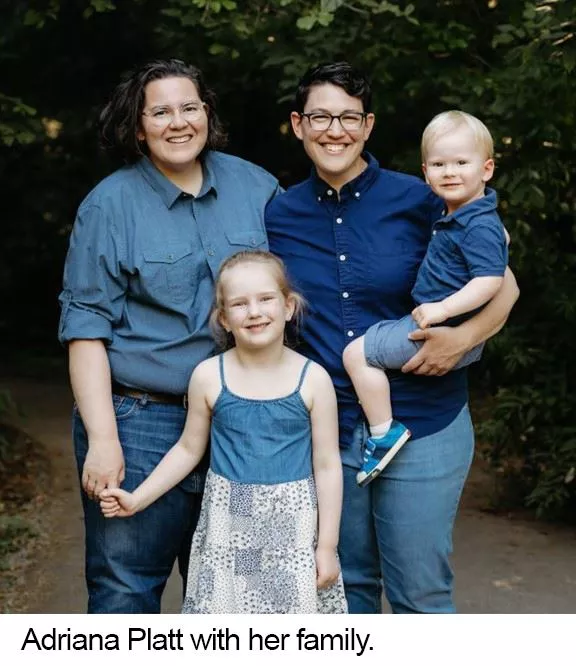 This reality led me to seek out my community at work and find role models like me at the executive level. I know how valuable it is to see yourself in others and to know that you are not alone. So I partnered with Intel human resources and found a brave VP who was willing to be the first in the Intel Out & Ally Leadership Council (Intel OALC), a group I co-founded. The goal of the council was to create community for LGBT+ executives and allies to demonstrate visibility and to make sure our LGBT+ colleagues could have a seat at the table.
This reality led me to seek out my community at work and find role models like me at the executive level. I know how valuable it is to see yourself in others and to know that you are not alone. So I partnered with Intel human resources and found a brave VP who was willing to be the first in the Intel Out & Ally Leadership Council (Intel OALC), a group I co-founded. The goal of the council was to create community for LGBT+ executives and allies to demonstrate visibility and to make sure our LGBT+ colleagues could have a seat at the table.
I had no idea how much LGBT+ employees at work needed this or how much change we could make, but I was thrilled to see that participation in the Intel OALC far exceeded our goal the first year of 20 workers, attracting 35 participants. The council influenced the creation of gender-neutral restrooms across campuses, improved health coverage to remove caps for gender affirming care for employees and their families, and established a way for every employee to self-identify by opting to share their sexual orientation and gender identity in workplace tools.
Self-identifying is crucial because, as we know – especially in the semiconductor industry – data and numbers matter. Everything including nursing and prayer rooms and gender-neutral restrooms are impacted by workforce demand. As demand grows, so does supply. Every opportunity for connection helps another group of team members feel fully embraced by the company. Self-identification data informs how we continue to improve that connection.
My experience at Intel has been incredibly welcoming. I had the good fortune to join a team who celebrated my life milestone of marrying my wife in the same spirit as my cis-hetero colleagues. Over time, all the teams who I invited in and shared my LGBT+ identity with reciprocated. When we adopted our daughter, my director hosted a shower like she would for all other people growing their family. I have been included as the default at Intel. I want my experience—my default—to be the experience for any LGBT+ person at Intel or in our industry.

While I remain proud of Intel’s efforts to quantify our LGBT+ population through self-identification, the Intel data shows that the experience of people in heterosexual relationships who identify with the gender they were assigned at birth does not extend to LGBT+ folks. While inequities remain, they can be overcome by allowing us to share our experiences and our lives with our colleagues and within the industry.
The semiconductor industry is at a moment of inflexion. We are poised to grow considerably. Chips are the new oil or gold. At the same time, workforce demographics are transforming. According to Statista, from 2012 to 2022 the percentage of people who identified as LGBT+ in the U.S. held steady across the Silent Generation, Baby Boomers, and Generation X. Among Millennials, self-identifying LGBT+ increased from 5.8% in 2012 to 11.2% in 2022.
But the undeniable change came with Generation Z. Today, around 20% identify as LGBT+, up from 15.9% in 2020. We need to make sure Gen Z and the generations to follow know that the semiconductor industry (and STEM generally) is a safe, welcoming, and inclusive place to build a career.
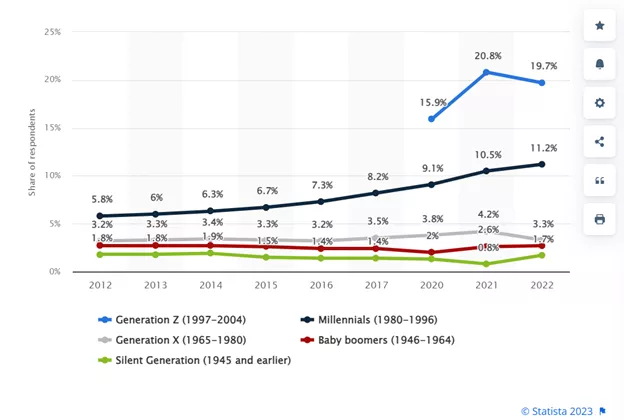
Share of respondents who identified as lesbian, gay, bisexual or transgender in the United States from 2012 to 2022, by generation.
A New Coalition is Needed
What can you do to ensure your organization is ready for the changing demographics of your workforce? To adapt to the evolving chip industry talent demands, it’s important to improve workforce cultures for the LGBT+ community of today and tomorrow and create an industry-wide shift to attract the most brilliant minds in the field. We must seize the opportunity to form new coalitions that work collectively on this issue.
Many other industries are making significant strides in their diversity and inclusion efforts, especially for the LGBT+ community. One effective strategy is for companies to partner across their industry on their efforts related to university and community college outreach and LGBT+ workforce development. These partnerships can amplify LGBT+ visibility and improve LGBT+ inclusion across our industry.
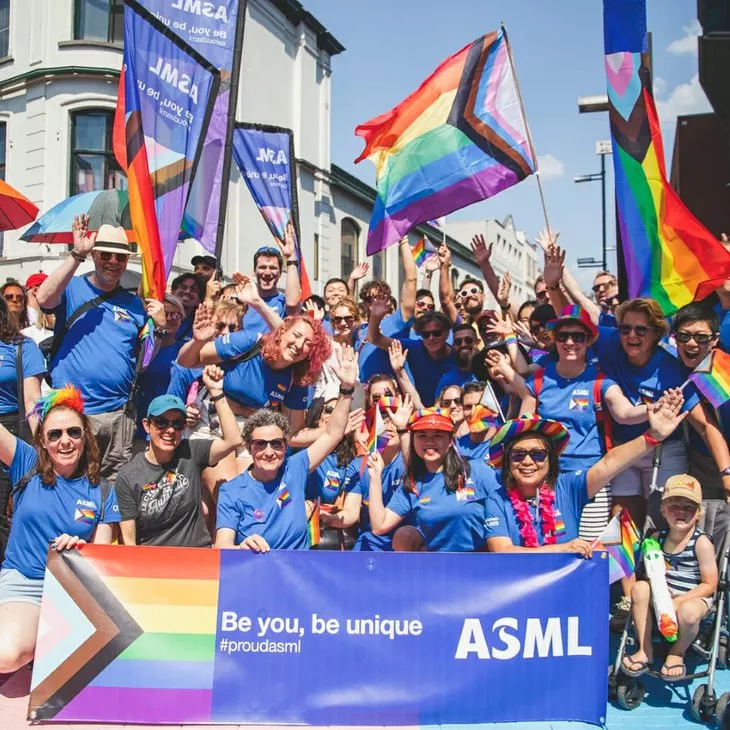
Members of Proud ASML at Eindhoven Pride in Eindhoven, The Netherlands on June 10, 2023
ASML is a great example of this type of work.
“At Proud ASML, we are engaged in creating visibility, awareness and fostering a safe and inclusive work environment,” said Dulce Pumareja, Customer Support Global Product Owner at ASML. “Recently, we participated in the first ever Pride Walk in our hometown of Eindhoven. It was a public show of support to the LGBTIQ+ community. Doing this together with the local community makes the message of equality, acceptance, and inclusion even louder. We would like to do the same with our industry counterparts in the business to make the color of inclusion brighter and the voice of equality louder in the semiconductor industry.”
By creating a coalition and normalizing best equity practices, we can strengthen our outreach, recruiting, and hiring efforts while improving perceptions of LGBT+ inclusion and company cultures across our industry.
As my children grow up watching their mom work in a highly technical, challenging, and fulfilling industry, I want them to always feel like they belong here too – no matter who they are or who they love. If you would like to join a new coalition to advance inclusion for LGBT+ in the semiconductor industry, email SEMI.LGBT.Coalition@intel.com.
About the Author
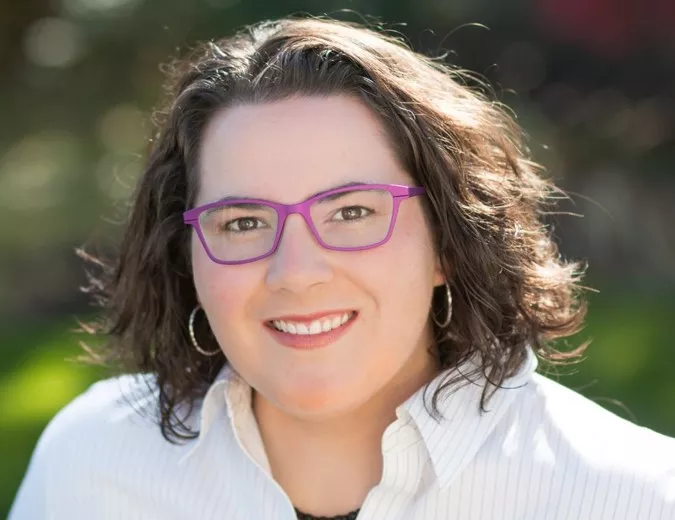 Adriana Platt is a contract manager in Global Supply Equipment and Materials at Intel. She’s held positions across Intel’s supply chain and has expertise negotiating across a diverse group of commodities, multiple geographies and some of Intel’s largest suppliers. In 2016, Platt co-founded the Out & Ally Leadership Council (OALC) bringing together Intel’s LGBT+ out leaders and allies to advance inclusion at Intel. She can be reached via LinkedIn.
Adriana Platt is a contract manager in Global Supply Equipment and Materials at Intel. She’s held positions across Intel’s supply chain and has expertise negotiating across a diverse group of commodities, multiple geographies and some of Intel’s largest suppliers. In 2016, Platt co-founded the Out & Ally Leadership Council (OALC) bringing together Intel’s LGBT+ out leaders and allies to advance inclusion at Intel. She can be reached via LinkedIn.